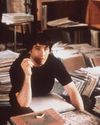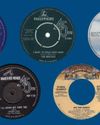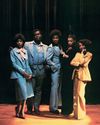
The first Tubeway Army single, That’s Too Bad, came out early in 1978, but it was quite a different sound from the likes of Cars, wasn’t it?
Yes. That record came out on 10 February, and I stayed in my job right up to the date that it came out. I was working for WH Smiths, driving a lorry and a forklift truck. At that point all I’d done was just write songs and put a band together to try to get a contract, and it was a bit punky because that was what was happening and what I thought I needed to be doing to get signed.
The first album wasn’t what the record company expected, was it?
They thought I’d be delivering a punk album. When I got in the studio and discovered the synthesizer in the control room, that was when everything changed. When I took the album to the record company, it really wasn’t what they wanted. I had a really big, quite heavy, argument with them that was almost aggressive at times. It was not a good meeting. About three-quarters of the way through, Martin Mills, who was the director who wasn’t shouting at me, said, “OK, why not release it and see what happens.” I’m embarrassed to say, and this was part of my argument with Beggars Banquet when I delivered the first album, that I said to them that this synth-based approach was a brand-new thing. I actually said, almost word-for-word, “Very soon other people are going to find out about this.” I was that ignorant of what was going on [laughs].
So, you weren’t influenced by the likes of Human League and Kraftwerk?
This story is from the {{IssueName}} edition of {{MagazineName}}.
Start your 7-day Magzter GOLD free trial to access thousands of curated premium stories, and 9,000+ magazines and newspapers.
Already a subscriber ? Sign In
This story is from the {{IssueName}} edition of {{MagazineName}}.
Start your 7-day Magzter GOLD free trial to access thousands of curated premium stories, and 9,000+ magazines and newspapers.
Already a subscriber? Sign In

Paperback Blighters - The books every record collector should read.
The books every record collector should read. Vinyl, you may have heard, has made a big comeback. In 2022, sales of vinyl albums surpassed compact discs (CDs) for the first time in more than three decades in terms of global revenue, racking up more than $1.2bn.

"Beware the Savage Lure/of 1984..." - David Bowie is one of the most venerated musicians ever. But even he had his bad periods.
David Bowie is one of the most venerated musicians ever. But even he had his bad periods. For many, 1984 remains the nadir of his Phil Collins” phase; an artistic/sartonial/tonsorial disaster area. But was it really that awful? Forty years on, Matt Phillips explores Bowie's so-called annus horribilis.

7" Heaven & Hell the Story of the 45 - The 45 turns 75 this year. Matthew Quinlan charts its history, recalling the RPM wars and two belligerent titans who went into battle over the speed of spinning sound
Someone needs to come and empty the bins behind the Lloyds Bank branch in Kingston-upon-Thames. It’s been raining and flattened cardboard slumps next to a flytipped air conditioning unit and a rusting clothes rack. There are two signs at head height on the red brick wall. One warns that you’ll be clamped if you park here; the other, a stainless-steel plaque, marks Nipper’s 100th birthday. Nipper, the dog at the heart of the HMV and RCA Victor logos, was a white terrier with chocolate brown ears, maybe a Jack Russell, Smooth Fox, or Bull Terrier, more likely a mix. This is his final resting place. He was buried under a mulberry tree but, you know, urban sprawl, progress, etc. The plaque was unveiled by the Chairman of HMV Stores on 15 August 1984, while Captain Sensible, Janice Long, and a Nipper doppelganger looked on. Round the corner, at HMV and Our Price, George Michael’s Careless Whisper was flying off the shelves, and every copy turned at 45 RPM.

STARS ON 45s
A BUNCH OF MUSICIANS - 45, COUNT 'EM! RHAPSODISE ABOUT THEIR FAVOURITE SINGLE

THE TORTURED SHOPPER'S DEPARTMENT
John Coleman celebrates the great art of vinyl collecting on the 45th Anniversary of Record Collector and finds out, in an exhausting series of anxietyinducing sprees, how much vinyl you can buy today, ina variety of outlets, with 45.

Young American
A serendipitous collaboration with David Bowie in 1974 kick-started Luther Vandross' recording career. But he still faced an uphill struggle to succeed as a solo artist. Charles Waring talks to some of the singer's most trusted collaborators about his early years and how he battled to be heard....

MOD ALMIGHTY
Steve Ellis began his career as a mod in flower-power clobber as frontman of chart-toppers Love Affair. Quitting in 1970, he worked with The Who's Roger Daltrey then gave up music to become a docker before a near-death experience. Interest in his work was rekindled after hooking up with long-time fan Paul Weller. Lois Wilson hears how his romance with music endures.

ANARCHISTS IN THE UK
EXACTLY 45 YEARS AGO, CRASS, THE ANARCHIST ACTIVIST COLLECTIVE, WERE FINISHING PIVOTAL SECOND ALBUM, STATIONS OF THE CRASS.

The boy with the thorn in his side
David Cassidy was arguably the biggest solo star of the immediate post-Beatles era, yet his fame as well as his boyish good looks and extracurricular excessesovershadow the excellence of his breathily intimate, musically accomplished records. Simon Goddard, RC contributor and author of an acclaimed series of books on David Bowie, hails the work of the tortured pop idol

"I COULD JUST THROW MUD AT THE WALL"
There's little sign of slowing down from the 19-year-old Pete Townshend. Currently on the go: multi-media project The Age Of Anxiety; a dance production of Quadrophenia; and Pete Townshend Live In Concert 1985-2001, a 14-disc boxset of his solo in-concert recordings. Not, he admits, that his every whim and fancy are worth deeper exploration. \"Some of them are good ideas, some of them are pretty dumb,\"